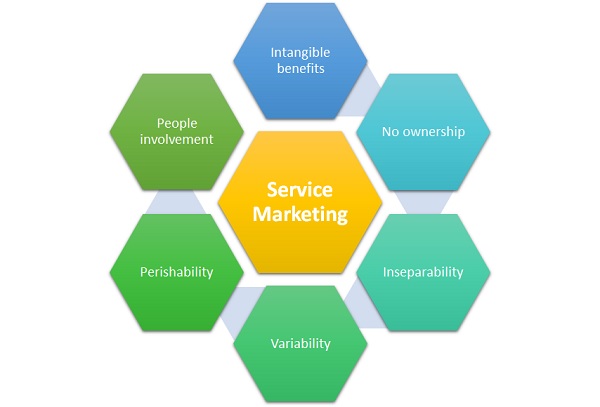- Business Concepts ›
- Marketing and Strategy ›
- Service Marketing
Service Marketing
Definition, Importance, Types, Factors & Example
This article covers meaning & overview of Service Marketing from marketing perspective.
What is meant by Service Marketing?
Service marketing is a type of marketing which is used to promote and showcase the intangible benefits and offerings delivered by a company to drive end customer value. This can be for standalone service offerings or complementary services to tangible products. Service marketing is a concept which focuses mainly on the business of non-physical intangible goods. It is done for company given benefits which cannot be seen, touched, felt etc. These are benefits which are driven mostly by people, process & cannot be kept by a customer.
Sectors like hospitality, tourism, financial services, professional services etc. use service marketing to drive their business.
Importance of Service Marketing
Marketers market different types of entities such as goods, services, events, persons etc. The marketing of services is known as service marketing. Services are essentially intangible and does not result in the ownership of anything. Its production may or may not be tied to a physical product.
Service marketing excellence requires excellence in three broad levels: external, internal and interactive marketing.
External marketing covers the pricing, distribution and promotion of services to consumers. Internal marketing involves training and motivating employees to serve customers well. Interactive marketing describes the employees’ skill in serving the client.

Read More
Factors in Service Marketing
The key factors which define marketing for services are:
1. Intangible
services are non-physical unlike physical products which can be touched, felt, seen. This makes services different from products and hence the marketing approach would also be different.
2. No ownership
Services cannot be owned but can only be experienced. This is a holistic concept which is related to customer experience.
There is ownership in service in form of evidence like plan, bills, invoice etc. but you cannot own it like a product.
3. Inseparability
Service marketing is driven by a concept of moment of truth, i.e. the services are created & used at the same moment.
They cannot be stored like products in an inventory, they are produced and consumed at the same time.
4. Variability
Services vary in nature despite the same people, process, type of work etc., unlike standardized products. Different customers can get different experience for exactly the same service used.
e.g. a telecom customer might get different experience for the same plan.
5. Perishability
Unlike products which can be stored, services are consumed at that very moment. But there is another way to look at it as well. These days many services or plans do have expiry date. They are not similar to best before dates in products but these dates are more in terms of validity of service.
e.g. free warranty service after 2 years of purchase.
6. People involvement
Service marketing is driven by people who provide benefits & solutions to the needs of the customers. These days lot of automatic service solutions are coming up but people play the most important role in service marketing.
Service marketing planning involves taking care of 7Ps. Price, Place, Promotion, Product, People, Process and Physical evidence.
Types of Service Marketing
There are broadly 3 types of service marketing:
1. B2C
This is the main customer service provided by companies to its end customers. These can be telecom, hospitality, financial services, repair provided by providers. The main focus of the company can be selling service. E.g. Vodafone provides telecom services to consumers and markets it as its core offering.
2. B2B
Many companies provide services to enterprises and organizations. These can be networks, finance, travel, technology services etc. The motive is to show business value to an organization through usage of their service. This forms the core part of the b2b service marketing.
E.g. Many technology services firms showcase their references and case studies where they derived value for similar organizations as the target customer. The value can be in terms of cost savings, revenue increase.
3. Post Purchase Service
This category if service marketing focuses on the add on and complementary services offered by companies in addition to the core product (or service in some cases). These can be warranty services, customer support, service request resolution, helpdesk, repairs etc. These services can be differentiating factor for customers when they buy the core offering. E.g. When a person buys a phone but gets 2 years of free warranty service and support. This can become a differentiator and forms part of the service marketing done by the phone manufacturer.
Examples of Service Marketing
Marketing of any of the service sector such as restaurants, banks, airlines etc. would come under service marketing.
1. Every bank conducts training programs across its stores to empower investors to take informed decisions on their investments. This is a part of service marketing involving people and process. Banks provide services of opening account, giving loans, provides lockers etc. These are all intangible services.
2. Ecommerce companies & food delivery apps are also examples of service marketing companies. Their platform provides a service and connects buyers & sellers.
Hence, this concludes the definition of Service Marketing along with its overview.
This article has been researched & authored by the Business Concepts Team which comprises of MBA students, management professionals, and industry experts. It has been reviewed & published by the MBA Skool Team. The content on MBA Skool has been created for educational & academic purpose only.
Browse the definition and meaning of more similar terms. The Management Dictionary covers over 1800 business concepts from 5 categories.
Continue Reading:
What is MBA Skool?About Us
MBA Skool is a Knowledge Resource for Management Students, Aspirants & Professionals.
Business Courses
Quizzes & Skills
Quizzes test your expertise in business and Skill tests evaluate your management traits
Related Content
All Business Sections
Write for Us